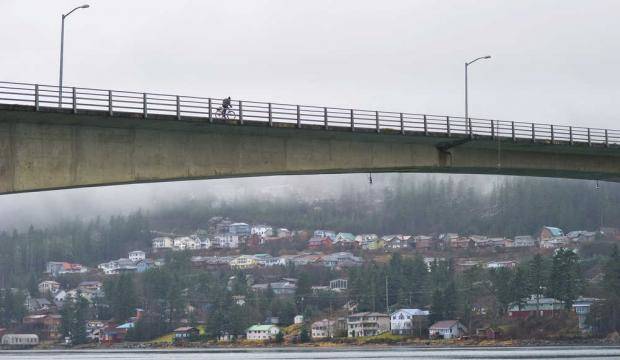The “very dramatic” rise in property crime in the Juneau area understandably has residents concerned, from the Flats to downtown and including areas traditionally thought of as safer neighborhoods, such as Douglas Island.
On Tuesday, that message came through loud and clear during the Douglas Island Neighborhood Association’s meeting, which this month focused on public safety. The Juneau Police Department was represented by crime prevention specialist Ken Colon, as well as officers Jason VanSickle and Kathy Underwood, members of the patrol team responsible for policing Douglas.
North Douglas resident Adam Watson, who works in security, said he has noticed a “major uptick” in the area’s drug problem, saying he often sees drug exchanges in the parking lot of the Breeze-In. Watson, and others present, told the JPD officers they would like a more visible police presence.
Association President Robert Sewell noted that the previous month, Lt. David Campbell had talked to the group about burglaries, which had essentially doubled from 2013 to 2014 and then doubled again in 2015.
[Juneau on track to see the most burglaries in a decade]
Sewell noted the community’s concern about the potential of a pre-trial facility being located in Douglas, an idea that has since been set aside, as well as the vandalism that saw 36 vehicles with their tires slashed along Douglas Highway April 26.
“Douglas has a tremendous sense of community,” Sewell said. “We would like to keep that relaxed life, that small community life.”
Crime prevention remains a concern, he said, adding, “What can we do as citizens?”
VanSickle told those in attendance that in the last seven months, more than 90 percent of the calls on Douglas came from the Cedar Park area. Most of the crime in Douglas does not involve violence, he said, listing a few domestic violence calls, some drunken driving and harassment calls, “quite a few” mental health calls, and property crime such as vandalism, burglary and theft.
“The numbers don’t lie,” Colon said. “Crime has, in fact, increased.”
And, Colon said, property crime definitely coincides with drug use.
“It’s a sad cycle,” he said. “I’m not going to sugar-coat it.”
Colon discussed what the police department is doing to combat crime, including a renewed emphasis on community policing with patrol teams assigned to regions.
He also promoted “crime prevention through environmental design,” a scaleable program that he will help home and business owners implement with one-on-one meetings. The idea, he said, is not to turn your home into a fortress complete with a gator-filled moat, but rather to eliminate the factors that make your home or business attractive to criminals.
Colon threw around a lot of acronyms but the concepts are common-sense — reducing opportunity and ability, for instance, improving lines of sight and reducing access, as well as fostering a sense of pride through maintenance of your property.
“Just be vigilant and aware of your surroundings,” he said.
A number of Douglas residents had questions about neighborhood watch programs and the best way to implement communication, both within the group and to law enforcement.
Colon said it is up to the group to decide what they might do, saying that one previous neighborhood watch program in Switzer Village mobile home park instituted patrol shifts, adding, one way to be creative was to schedule dog walkers so that the streets could be patrolled.
“Get creative,” he said. “You’ve got a great crew here. … This is the beginning of taking back (the community).”
The association agreed to bring the issue of neighborhood watch programs back at its June meeting; for more information, go online to its Facebook page, call 723-0147 or email dinaalaska@gmail.com.
• Contact reporter Liz Kellar at 523-2246 or liz.kellar@juneauempire.com.

